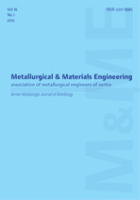
Metallurgical & Materials Engineering
Scope & Guideline
Exploring new horizons in materials research.
Introduction
Aims and Scopes
- Metallurgical Processes and Innovations:
Research on various metallurgical processes including but not limited to welding, casting, and coating techniques, along with innovative methods for enhancing material properties. - Material Characterization and Properties:
Focus on the characterization of materials, investigating their mechanical, thermal, and corrosion properties, and understanding how these properties can be tailored for specific applications. - Application of Advanced Materials:
Exploration of advanced materials such as composites, alloys, and nanomaterials, including their applications in sectors like automotive, aerospace, and construction. - Sustainability and Recycling Techniques:
Research initiatives aimed at promoting sustainability in materials engineering, including recycling processes and the development of eco-friendly materials. - Computational and Predictive Modeling:
Utilization of computational tools and predictive modeling techniques to understand material behaviors, optimize processes, and forecast performance under various conditions.
Trending and Emerging
- Smart Materials and Actuators:
An increasing number of studies are focusing on the development and application of smart materials, particularly those utilizing shape memory alloys for innovative applications in engineering and technology. - Sustainable Materials and Processes:
There is a noticeable trend towards researching sustainable materials and processes, including the recycling of materials and the development of eco-friendly composites, driven by global sustainability goals. - Advanced Characterization Techniques:
Emerging methodologies for material characterization, particularly those employing nanotechnology and advanced imaging techniques, are becoming a focal point for researchers aiming to better understand material properties. - Artificial Intelligence and Predictive Analytics:
The integration of AI and machine learning in materials research is on the rise, with studies focusing on predictive modeling to enhance material development and performance evaluation. - Multifunctional Composite Materials:
Research into multifunctional composites that provide multiple beneficial properties, such as enhanced strength and thermal resistance, is gaining momentum, reflecting the need for innovative materials in various applications.
Declining or Waning
- Traditional Metallurgical Techniques:
There appears to be a waning focus on conventional metallurgical processes that do not incorporate modern advancements or innovations, as the field shifts towards more cutting-edge techniques. - Purely Theoretical Studies:
Research that lacks empirical validation or practical application is becoming less prominent, as the journal emphasizes studies that combine theory with experimental evidence. - Static Material Studies:
Investigations that only assess materials under static conditions without considering dynamic or real-world applications are declining, as there is a growing demand for studies that reflect actual service conditions.
Similar Journals
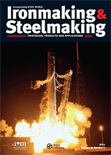
IRONMAKING & STEELMAKING
Exploring the Future of Iron and Steel ProductionIRONMAKING & STEELMAKING is a premier peer-reviewed journal published by SAGE Publications Inc, dedicated to advancing the field of metallurgical engineering and materials science. With a notable ISSN of 0301-9233 and an E-ISSN of 1743-2812, this journal has established itself as a significant platform for disseminating high-quality research on ironmaking processes, steel production, and associated technologies. Covering a broad scope of topics, it is indexed in the top quartiles (Q2) in Materials Chemistry, Mechanical Engineering, Mechanics of Materials, and Metals and Alloys for 2023, underscoring its pivotal role in these disciplines. Since its inception in 1974 and continuing through 2024, IRONMAKING & STEELMAKING attracts a global audience of researchers, professionals, and students, contributing valuable insights and innovations in the field. Although not an open-access publication, subscribers can access essential findings that shape the future of metallurgy and steelmaking. This journal not only serves as a repository of knowledge but also as a beacon for ongoing research and technological advancement, making it a must-read for those passionate about materials science.
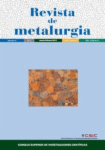
REVISTA DE METALURGIA
Fostering collaboration in the world of metallurgical science.REVISTA DE METALURGIA, published by the CONSEJO SUPERIOR INVESTIGACIONES CIENTIFICAS-CSIC in Spain, stands as a significant open-access journal since 1995 that focuses on the fields of condensed matter physics, materials chemistry, and the study of metals and alloys. With an ISSN of 0034-8570 and an E-ISSN of 1988-4222, this journal aims to disseminate innovative research findings and reviews that contribute to the understanding and advancement of metallurgical science. Although currently ranked in the fourth quartile across several relevant categories in Scopus, including Materials Science and Physics, its commitment to open access promotes the wider distribution of knowledge in these fields, ensuring that emerging findings are accessible to researchers, industry professionals, and students alike. The journal covers research from its earliest issues in 1968, maintaining a continuous archive that enhances its contributions to the scientific community. For those passionate about the complexities of material properties and behaviors, REVISTA DE METALURGIA serves as a platform for impactful scholarship and collaborative advancement.

Acta Metallurgica Sinica-English Letters
Innovating Industrial Engineering Through Rigorous Scholarship.Acta Metallurgica Sinica-English Letters, published by the Chinese Academy of Sciences, Institute of Metal Research, is a premier international journal that has been fostering the advancement of knowledge in the fields of Industrial and Manufacturing Engineering and Metals and Alloys since its inception in 1997. With a commendable impact factor and ranking within the top quartiles (Q1) of leading Scopus categories, this journal serves as a vital platform for researchers and professionals to disseminate innovative research findings and groundbreaking methodologies. Notably recognized with a Scopus rank of #34 out of 176 in Materials Science and rank #81 out of 384 in Engineering, it provides a robust space for high-quality, peer-reviewed articles, thus bridging the gap between theoretical advancement and practical application in metallurgy and materials science. Although currently not an open-access journal, its rigorous editorial standards and comprehensive scope ensure that only the most impactful research contributes to the scientific community and industry advancements globally. Acta Metallurgica Sinica-English Letters is an essential read for anyone eager to stay informed on cutting-edge developments within these crucial domains.

Russian Journal of Non-Ferrous Metals
Exploring the Mechanics of Metals and AlloysThe Russian Journal of Non-Ferrous Metals, published by PLEIADES PUBLISHING INC, serves as a vital resource for researchers and professionals in the fields of materials science and engineering. With a dual ISSN (1067-8212 for print and 1934-970X for online), this journal has been instrumental in disseminating cutting-edge research from 2007 to 2023. Specializing in the mechanics of materials, metals and alloys, and the study of surfaces, coatings, and films, it provides invaluable insights into the latest advancements and applications in these areas. Although currently categorized in the Q4 tier for mechanics of materials and surfaces, and Q3 for metals and alloys in the 2023 rankings, its commitment to quality research is reflected in its Scopus metrics, ranking it within the competitive spectrum of its fields. While not an open access journal, it remains a crucial academic platform for fostering knowledge exchange among professionals and scholars. By publishing high-quality articles, the Russian Journal of Non-Ferrous Metals contributes significantly to the ongoing dialogue in metallurgical science and engineering.

Metallurgical Research & Technology
Advancing metallurgical innovation for a sustainable future.Metallurgical Research & Technology is a distinguished journal published by EDP SCIENCES S A based in France, focusing on the dynamic field of metallurgical science and engineering. With a strong emphasis on the latest advancements in Materials Chemistry, Computational Mechanics, and Mechanics of Materials, this journal aims to provide a platform for researchers to share innovative findings that propel the field forward. As of 2023, it has secured a commendable position in various categories, including Q3 rankings in Computational Mechanics, Materials Chemistry, and Mechanics of Materials, along with a Q2 ranking in Metals and Alloys. The journal actively promotes open access, facilitating broader dissemination of critical research across the globe. Researchers, professionals, and students in the metallurgical domain will find Metallurgical Research & Technology an invaluable resource for cutting-edge developments and collaborative opportunities.

METALLURGICAL AND MATERIALS TRANSACTIONS B-PROCESS METALLURGY AND MATERIALS PROCESSING SCIENCE
Exploring Innovations in Process Metallurgy and Material ScienceMETALLURGICAL AND MATERIALS TRANSACTIONS B-PROCESS METALLURGY AND MATERIALS PROCESSING SCIENCE, published by Springer, serves as a pivotal platform in advancing the field of materials science, focusing specifically on the intricacies of process metallurgy and materials processing. With an ISSN of 1073-5615 and an E-ISSN of 1543-1916, this esteemed journal boasts an impressive standing with its 2023 category quartiles, ranking Q2 in Condensed Matter Physics, Materials Chemistry, and Mechanics of Materials, while achieving a top-tier Q1 classification in Metals and Alloys. Positioned in the United States, the journal has been publishing leading research since its inception, with converged years spanning from 1973 to 1979 and 1995 to 2024. The journal's robust impact within its fields is reflected in its Scopus rankings, notably ranking #42 out of 176 in Materials Science with a 76th percentile. Though not an open access journal, its comprehensive and high-quality research articles cater to the needs of researchers, professionals, and students, ensuring they remain at the forefront of advancements in metallurgy and materials processing science.
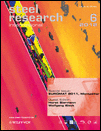
STEEL RESEARCH INTERNATIONAL
Fostering Knowledge in Material Chemistry and Metallurgy.STEEL RESEARCH INTERNATIONAL, published by WILEY-V C H VERLAG GMBH, is a premier journal that serves as a vital source of knowledge in the fields of condensed matter physics, materials chemistry, and metal and alloy research. With an ISSN of 1611-3683 and an E-ISSN of 1869-344X, this journal provides open access options that enhance its visibility and accessibility. Recognized for its scientific merit, it currently holds a Q2 ranking across multiple categories including Condensed Matter Physics and Materials Chemistry. This translates to an exceptional placement within the 64th percentile for Metals and Alloys and substantial recognition in other related fields according to Scopus rankings. By bridging theoretical concepts and practical applications, STEEL RESEARCH INTERNATIONAL aims to foster innovative research and dissemination of knowledge among researchers, professionals, and students focused on advancing the metallurgy and materials science domains. With a commitment to remain at the forefront of research from 2003 to 2024, the journal is poised to continue shaping the future of steel and alloy studies.

INDIAN JOURNAL OF ENGINEERING AND MATERIALS SCIENCES
Unlocking Potential Through Open Access ResearchThe Indian Journal of Engineering and Materials Sciences is a pivotal publication within the engineering and materials science realms, focusing on fostering innovative research and knowledge dissemination in these dynamic fields. Published by the renowned National Institute of Science Communication (NISCAIR), this journal plays a critical role in bridging the gap between academic research and practical application. With its impact reflected in a Q2 ranking in Engineering and a Q3 ranking in Materials Science for 2023, the journal positions itself as a significant contributor to the discourse surrounding engineering advancements and material innovations. Since its inception in 1994, it has been a platform for researchers, professionals, and students, enhancing their ability to access high-quality research outputs. The journal is committed to providing open access to its valuable content, ensuring that knowledge remains universally accessible. As the field continues to evolve, the Indian Journal of Engineering and Materials Sciences remains a vital resource for those aiming to stay at the forefront of research and development.
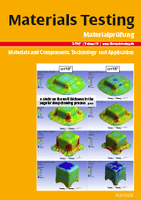
Materials Testing
Pioneering Innovations in Material PerformanceMaterials Testing is a renowned journal published by Walter de Gruyter GmbH, serving the global scientific community in the fields of Materials Science, Mechanical Engineering, and Mechanics of Materials. With an ISSN of 0025-5300 and an E-ISSN of 2195-8572, this journal has been a significant contributor to the discourse on material performance, testing methodologies, and engineering innovations since its inception. The journal is recognized for its rigorous peer-review process and holds a commendable Q2 quartile ranking in multiple categories for 2023, showcasing its impact and relevance in the field. With open access options available, Materials Testing aims to disseminate valuable research findings and practical insights that drive advancements in technology and materials applications. By addressing the latest challenges and developments within the field, this publication serves as an essential resource for researchers, professionals, and students alike, fostering a deeper understanding of material properties and testing techniques.

Journal of Metals Materials and Minerals
Advancing Knowledge in Metallurgy and Materials ScienceJournal of Metals Materials and Minerals (ISSN: 0857-6149) is a renowned academic publication dedicated to the interdisciplinary fields of metallurgical science, materials engineering, and mineralogy. Published by Chulalongkorn University, Metallurgy & Materials Science Research Institute in Thailand, this journal serves as a pivotal platform for researchers to disseminate their findings and explore innovative applications related to metals, ceramics, polymers, and biomaterials. Although the journal does not currently adopt an open-access model, it provides insightful content that facilitates knowledge sharing among professionals and academics alike. The journal has established its credibility with impressive Scopus ranking percentiles, particularly in categories such as Metals and Alloys and Ceramics and Composites. With an emphasis on advancing the understanding of materials science from 2017 to 2024, the Journal of Metals Materials and Minerals remains an essential resource for those striving to contribute to and stay informed about the latest trends and breakthroughs in these dynamic fields.